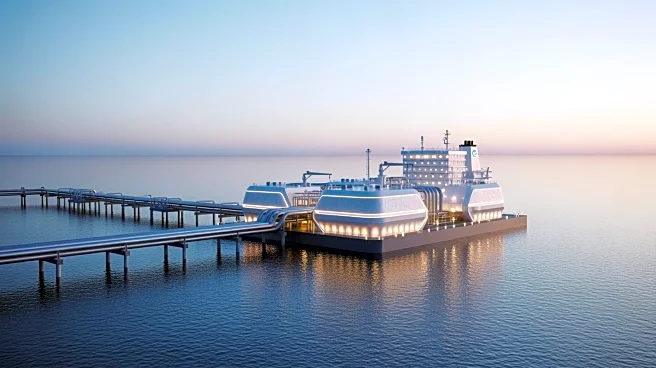What's Happening?
ECOnnect Energy has secured two pre-Front End Engineering and Design (pre-FEED) contracts for its innovative IQuay Regas Terminal. This modular floating regasification system is designed to offer a faster and more flexible alternative to traditional onshore
and floating LNG terminals. The IQuay Regas Terminal integrates a Floating Storage Unit (FSU), a modular floating regasification platform known as the R-Class, and either subsea or floating pipelines for high-pressure gas transfer to shore. The system's compact and scalable architecture aims to accelerate LNG import readiness in regions facing infrastructure and energy security challenges. The terminal can be deployed in less than 20 months, providing a significant advantage over conventional terminals that require years to complete. It is designed for harsh offshore conditions, incorporating advanced mooring, safety, and automation features to ensure continuous performance.
Why It's Important?
The development of the IQuay Regas Terminal is significant as it addresses the growing global demand for regasification solutions, which is outpacing the availability of purpose-built Floating Storage Regasification Units (FSRUs). The system offers a fast-track, cost-effective solution for small to mid-scale LNG import projects that might otherwise struggle to achieve commercial viability. Its modularity allows for future adaptation to integrate renewable energy or carbon capture and storage systems, making it a sustainable option for the energy sector. The terminal's design minimizes seabed disturbance and operational footprint, ensuring compliance with environmental regulations and reducing project costs and execution risks. This innovation could potentially transform LNG import strategies, especially in regions with limited infrastructure and strict environmental constraints.
What's Next?
The IQuay Regas Terminal's deployment is expected to proceed rapidly, with the system being operational in less than 20 months. ECOnnect Energy plans to collaborate with clients to explore how the terminal can drive sustainability and operational excellence. The company is also looking into expanding its technology lineup, which includes the C-Class and R-Class semi-submersible platforms, to enhance deployment flexibility in diverse offshore conditions. As the demand for LNG continues to rise, the IQuay Regas Terminal could play a crucial role in meeting energy needs while adhering to environmental standards.
Beyond the Headlines
The IQuay Regas Terminal represents a shift towards more sustainable and adaptable energy infrastructure solutions. Its ability to integrate renewable energy and carbon capture systems highlights a growing trend in the energy sector towards reducing carbon footprints and enhancing environmental compliance. This development could lead to broader adoption of modular and floating infrastructure in other areas of energy and resource management, potentially influencing future policy and investment decisions.














